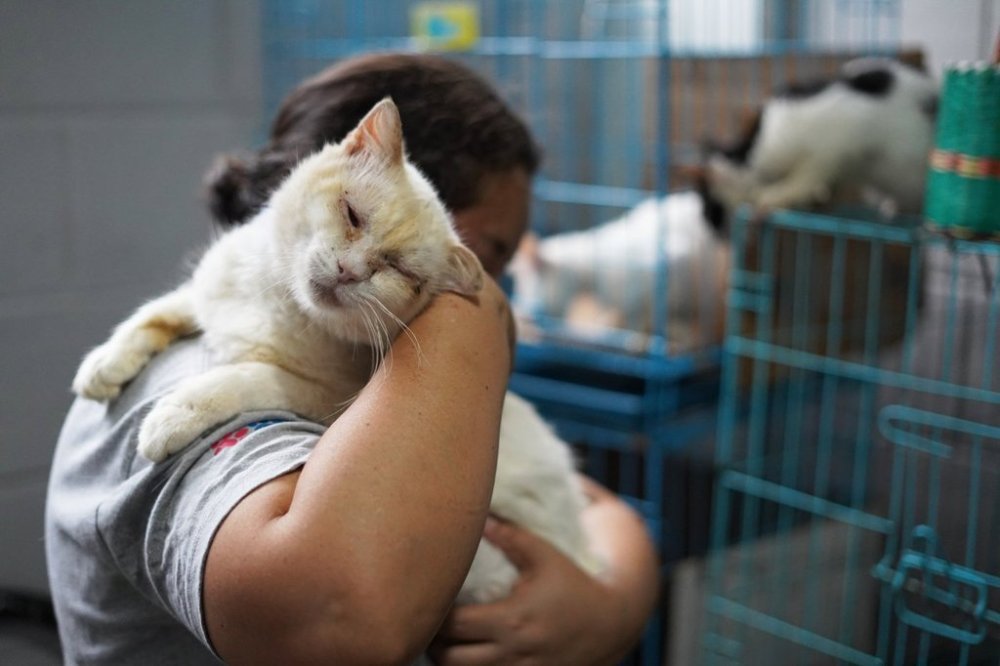El Salvador’s president seeks help in caring for country’s thousands of stray dogs and cats
Advertisement
Read this article for free:
or
Already have an account? Log in here »
To continue reading, please subscribe:
Monthly Digital Subscription
$0 for the first 4 weeks*
- Enjoy unlimited reading on winnipegfreepress.com
- Read the E-Edition, our digital replica newspaper
- Access News Break, our award-winning app
- Play interactive puzzles
*No charge for 4 weeks then price increases to the regular rate of $19.00 plus GST every four weeks. Offer available to new and qualified returning subscribers only. Cancel any time.
Monthly Digital Subscription
$4.75/week*
- Enjoy unlimited reading on winnipegfreepress.com
- Read the E-Edition, our digital replica newspaper
- Access News Break, our award-winning app
- Play interactive puzzles
*Billed as $19 plus GST every four weeks. Cancel any time.
To continue reading, please subscribe:
Add Free Press access to your Brandon Sun subscription for only an additional
$1 for the first 4 weeks*
*Your next subscription payment will increase by $1.00 and you will be charged $16.99 plus GST for four weeks. After four weeks, your payment will increase to $23.99 plus GST every four weeks.
Read unlimited articles for free today:
or
Already have an account? Log in here »
SAN SALVADOR, El Salvador (AP) — After drubbing El Salvador’s gangs during a more than three-year state of emergency, President Nayib Bukele turned his attention this month to another persistent, but softer, problem: his country’s many, many stray cats and dogs.
“Thousands of dogs and cats live on our streets. We want to change that, but without cruelty. We have the financial resources, but we seek expert partners to make it a model for Latin America,” Bukele wrote on X on Oct. 8. “Who wants to come and help?”
San Salvador struggles with a problem widely seen in cities across Latin America, as free-roaming cats and dogs sleep on the streets with no one to care for them. Dogs can be spotted lying on the warm asphalt on road shoulders, skillfully crossing six lanes of traffic like it’s a walk through the park or picking through trash on edges of a market. But they’re often underfed, sick or injured, searching for food and water.

It’s not clear what kind of solution Bukele, a controversial leader fond of spectacles with a well-oiled government communications machine, is aiming for, but he likes a problem that lends itself to a grand solution.
Plus, the millennial leader appears to have a soft spot for rescues. He adopted a dog, Cyan, while he was mayor of San Salvador, the capital.
At the Good Fortune Rescue shelter in Zacamil, just north of the capital, Rafaela Pérez said something needed to be urgently done “because the number of abandoned animals you see daily and that are reported on social networks is minimal compared to those that really exist.”
“We need to change this bad culture of abandoning and getting rid of animals because they are living beings,” she said.
Bukele and his allies have already taken steps to address a shortage of public institutions to care for animals, which has left cash-strapped non-governmental organizations often filling in the gaps.
In 2021, a government controlled by his New Ideas party made animal abuse in El Salvador punishable by prison sentences ranging from two to four years, as well as fines.
In 2022, his administration opened the region’s first public veterinary hopsital, the Chivo Pets Hospital. It provides services at a symbolic cost of 25 cents, or its equivalent in Bitcoin.
Patricia Madrid of Fundación Gratitud, the head of an organization dedicated to spaying, neutering and providing care to stray dogs, has long worked with six other volunteers in the streets of Salcoatitan, around 50 miles from El Salvador’s capital. But they’ve struggled to keep up since their funding comes from just one Salvadoran woman living in the United States.
Madrid said she hopes that her organization can work together with the government to change that.
It wasn’t immediately clear where the money for Bukele’s latest project will come from. He has touted earnings from buying the cryptocurrency bitcoin, but the Central American country faces mounting debt and received a $1.4 billion loan from the International Monetary Fund earlier this year.
Bukele previously enlisted help from China to build a modern public library in the main square of San Salvador.
Praise for the animal welfare idea has also come from outside the country, from people like Niall Harbison, a Thailand-based social media influencer who said he’s “on a mission to save stray dogs around the world,” by raising money to finance their sterilization.
Harbison responded to Bukele’s public call on a social media post on X, saying he “would love to talk about how to help.” He added that he would hop on a plane to meet with people to see what he can do.
“I’ve always been looking for a country to partner with to show how collaboration between the private and public sectors can work — to make it so effective that other countries can copy and implement it,” Harbison wrote.
“Let’s do it,” the social media savvy president responded.

